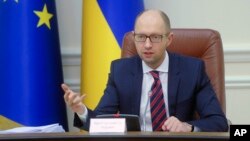While the war between Ukrainian forces and Russia-backed rebels in Ukraine's east simmers, a trade war is heating up between Kyiv and Moscow that political analysts say will further damage their already struggling economies.
Ukraine on Wednesday said it would no longer buy Russian gas and decided to close its airspace to Russian planes.
Russia's state gas company Gazprom on Wednesday morning said it stopped flows of gas to Ukraine because it refused to pre-pay for deliveries.
Ukrainian officials said they stopped buying Russian gas as they could buy from neighboring countries instead. Many European countries buy Russian gas pumped through Ukraine.
Gas, coal supplies
The head of Gazprom, Alexei Miller, claimed Ukraine did not have enough gas to get it through the winter.
Analysts say a mild winter, and gas stores, mean Ukraine has enough to get by. “But, what is actually much more serious for Ukraine is the coal situation,” says visiting scholar at the Carnegie Endowment Balazs Jarabik. “Because almost 50% of the electricity production is not based on gas but based on coal.”
Jarabik also says although there are bigger coal reserves than last year, “the essential calculation today ... is that they have 40% less than what [is] needed to survive the winter.”
Russian state media report the Kremlin cut off coal sales to Ukraine this week in retaliation for its not repairing pylons supplying electricity to Crimea. Russia-backed rebels in eastern Ukraine, where most of its coal comes from, had earlier stopped supplies to Ukrainian-controlled areas.
Nearly two million people on the Russia-annexed peninsula have been without power since pylons supplying them were blown up days ago. Tatar activists and Ukrainian nationalists, angry at what they see as Kyiv's lack of action against Russian aggression, have prevented authorities from repairing the pylons.
Jarabik says the damage has consequences for Ukraine's electricity production as well because the grids between Crimea and mainland Ukraine are interconnected. “So, this is not only a blow to Crimea but essentially a blow to Ukraine itself.”
Transport wars
Ukraine's Prime Minister Arseniy Yatsenyuk on Monday announced a temporary ban on cargo traffic with Crimea. The trade restriction formalized a blockade in place by activists since September. It was not clear how long the ban would last.
Yatsenyuk on Wednesday announced all Russian planes would no longer be allowed to transit Ukrainian airspace as an issue of “national security as well as a response to Russia's aggressive actions.”
Kyiv in October banned all Russian airlines from landing in Ukraine but was allowing them to fly over the country. Moscow retaliated by banning all Ukrainian airlines from landing in Russia and was expected to take similar reciprocal measures to the transit restriction.
Russia is threatening to block most food imports from Ukraine in January when a free trade agreement with the European Union comes into effect. Moscow complains lower-priced European goods could use Ukraine to get into Russia. Ukraine has vowed to retaliate against any Russian import ban with its own embargo.
Economies suffer
Jarabik says the escalating trade war is bad news for both sides, but especially Ukraine. “None of the countries though really can afford it,” he says. “The Russian economy is also not in the best shape from the low oil prices as well as the sanctions ... but it's the Ukrainian economy which is in a much worse shape.”
While Russia's economy is in recession, and expected to shrink by around four percent this year, Ukraine's economy is expected to contract about nine percent. Some projections show both economies recovering in 2016, while the World Bank says Russia's will continue to slump for another year.
Ukraine has been struggling to reform economically and politically while battling Russia-backed rebels who took over its industrial southeast, known as the Donbas.
Tensions between Kyiv and Moscow soared after Russia annexed Crimea and began supporting the rebels. Eight thousand people have since died in fighting and millions have been displaced. Despite overwhelming evidence of Russian military backing, including captured troops, the Kremlin claims to provide only humanitarian support and says any Russian troops in Ukraine are volunteers on vacation.
Russian hopes
A shaky ceasefire signed in February saw some progress in recent months as both sides pulled back armaments, though sporadic clashes continue to add to the death toll.
Pavel Felgenhauer, a defense analyst and columnist with Novaya Gazeta newspaper, says seasonal weather, troop rotation, and decisions made in Moscow temporarily halted most of the fighting. He says Russia will do whatever it takes to keep Ukraine in its sphere of influence.
“It could be military action, it could be economic pressure, political pressure, internal dissent and disintegration in Ukraine, which most likely right now Moscow is putting its stakes in: hoping Ukraine will disintegrate on its own so there will be no need to go to war,” he says.
Russia's airstrikes in Syria, Felgenhauer adds, are not distracting it from Ukraine, as the two conflicts involve different branches of the military and the Kremlin considers Ukraine a more important objective.
“Because Ukraine is basically the prime thing, seen as totally essential to Russia's defense and actual continuation as a great power, part of our outer, strategic perimeter," says Felgenhauer, describing the Russia's campaign in Syria as "important but not that important.
“Hence the commitment of troops to Ukraine and Syria are rather lopsided,” he says. “The Syrian contingent up to now is not real big, compared to how much resources and forces have been committed to Crimea and Donbas — and more are standing by.”
Russia on Wednesday announced it was sending S-400 missile systems to its base in Syria after a Turkish F16 on Monday shot down a Russian bomber flying along its border. One of the Russian pilots and a search and rescue paratrooper were killed, Russia's first confirmed combat casualties in Syria. Despite the escalating military involvement in Syria, Russian officials insist they will not use ground troops.










